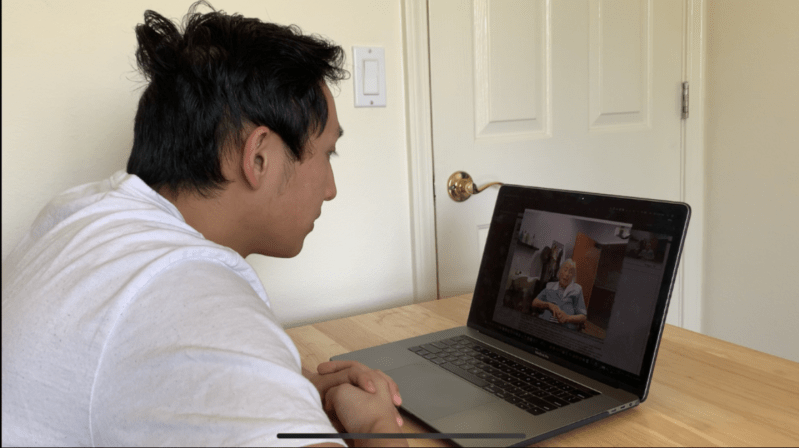Stanford students and affiliates have launched a volunteer-based program that connects Stanford community members with nursing home and assisted-living residents for video calls to combat the isolating effects of COVID-19 on seniors living in long-term care facilities.
Virtual Park Bench was started by Dan Guo ’16 in the wake of the pandemic with the goal of recreating park benches, which often serve as spontaneous social hubs for the senior community, through scheduled video calls.
“When COVID-19 hit, the nursing home and long-term facility communities were hit particularly hard,” Guo said. “The Centers for Disease Control put a lot of restrictions on these facilities in response to the outbreak, such as no more visitations, in-person volunteering or community dining. These residents were left lonely in their facilities, where there is already an epidemic of loneliness.”
“This current era of devastation, loss, and loneliness has shown me and many others how important it is to be there for one another and to reach out to people, even total strangers,” student volunteer Avery Muniz ’21 added. “We’re all fighting the same fight. Residents in nursing homes are unable to see their families and other visitors, which can be incredibly isolating; I hope that I and other students can alleviate this burden at least a little bit by being companions and friends to the residents we talk to.”
In response to the pandemic’s potential to exacerbate isolation for senior citizens, Guo, medical students and undergraduates worked together to develop and execute a program that matches volunteers to residents based on their linguistic preference, time commitment and interests or backgrounds.
“We strive for long-term relationships between residents and volunteers,” Guo said. “Although we make the initial connection, these relationships blossom and grow on their own.”
Because not all long-term care facilities are equipped with the same technology, Virtual Park Bench tailors their platform for communication to each individual facility, sometimes using Skype or FaceTime on facility tablets.
“At first, I was really worried that the conversations would feel awkward, given that they were over facetime and with people I had never met before,” wrote volunteer Sophie Parsa ’22 in an email to The Daily. “But from my first conversation I could tell this was not going to be the case. The elderly have such interesting stories of their life and the conversations are super fun and smooth. I now usually talk to the same three people over a week and I feel like I’m really getting to know them.”
Since its launch in late March, the initiative has partnered with around 10 long-term care facilities in California to provide companionship and conversation to 50 senior citizens. The initiative has also connected with campus partners such as the Haas Center for Public Service to engage over 70 volunteers from the Stanford community.
Anyone affiliated with Stanford, including students, faculty, staff, postdocs and alumni can sign up to volunteer. Volunteers initially commit to one video call a week, but both parties can agree to add more sessions if they’re enjoying the experience. And according to Guo, they are.
“We actually had a Korean resident and a Koeran-speaking volunteer who were singing Bible verses,” Guo recalled. “The staff member comes in mid-session and they are both in tears from the emotions coming from this Bible verse. To see how much the resident missed social company and how we are providing even a sliver of that during this difficult time is something I’m so proud of our volunteers for.”
Volunteers were also effusive about their time with the program.
“One of the most memorable moments for me was when a resident and I had been talking and playing trivia for about two hours when the nurse came in, completely surprised to see that I was still there,” Muniz said. “She said she had never seen him talk to anyone for two hours straight before. It meant a lot to me knowing that he enjoyed my company and enjoyed talking enough to continue doing so for a long time.”
“Every resident I’ve had the opportunity to talk to has been exceptionally kind and warm,” Muniz added. “It’s always a joy to see and interact with residents; they have such positive attitudes and are full of wisdom and humor.”
“It’s really heartwarming when the residents introduce me as their ‘friend’ to the doctors and nurses that come to check on them during our conversations,” Parsa said.
Guo said that the program is currently in touch with facilities across different states and hopes to continue expanding.
Though Virtual Park Bench was created in response to COVID-19, the team said they hope that the relationships cultivated through the pandemic will outlast the lifting of social distancing protocols and the return to normal.
“One of the primary homes I work with is in Fremont so I’m hoping to be able to continue working with the residents even once school starts again,” Parsa wrote.
Muniz echoed Parsa, saying, “I’ve been lucky enough to make valuable connections with the people I’ve talked to that I think will last long after the pandemic is over. I look forward to the day when I will finally be able to see them in person.”
“The pandemic has brought more attention to the long-term care facility community with news articles about clusters of cases that exist in these facilities,” Guo said. “But these facilities have existed for a long time and their loneliness and isolation existed pre-pandemic. We were hoping to help out through the pandemic, but also want to continue to grow and blossom after it as well.”
Contact Sarina Deb at sdeb7 ‘at’ stanford.edu
